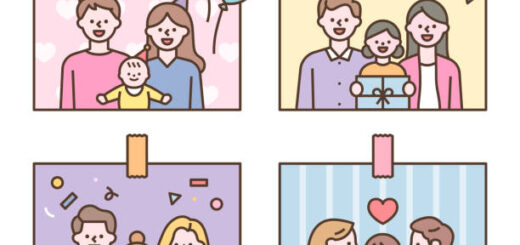Benefits of Family Counseling and How It Works
Family therapy or counseling deals with psychological, behavioral, and emotional problems causing family issues. Families will work with a counselor or therapist to maintain and develop a healthy relationship.
What is family counseling?
Family therapy or counseling is a way to maintain and develop healthy family relationships.
The objective is to identify problems within the family and find solutions. These issues can be behavioral, emotional, or psychological.
Family systems theory is the basis for many approaches to family therapy. This theory suggests that family systems are more complex than individual families.
According to the family system theory, changes in one family member will affect changes in another part of the family.
What is the difference between family therapy and counseling?
Both terms are used interchangeably. It involves talking to help families and individuals work through issues, conflicts, or mental disorders.
A therapist can have different credentials from a counselor. A counselor usually only needs a bachelor’s and can support clients. A therapist must have a master’s and a license to practice.
Counselors work with those who suffer from substance abuse disorders. A therapist will usually be the clinician who does family counseling.
The best way to find out what services and qualifications a mental health professional for families offers is to ask. Families can ask questions about their counseling style or psychological approach during a meet-and-greet.
The therapists and counselors must also be able to provide details about their training and licensing.
Types of Family Counseling
Some counselors provide home visits or online sessions. Families may find these sessions more comfortable than meetings in an office. Some families prefer counseling in a home-like environment, while others may not.
Family counseling can take many forms:
Functional Family Therapy
The focus is usually on families who have a child with a complex emotional disorder or behavior problems.
Parents or caregivers and children can attend 8-30 sessions per week together. These sessions teach families how to manage their child’s behavior better.
Multisystemic Therapy
The program aims to treat any emotional and behavioral problems that children and adolescents may have.
Multisystemic therapy also focuses on the child’s behavior in a broader sense. It can, for example, improve their interactions with social systems such as schools and neighborhoods.
Transgenerational therapy
A therapist will examine interactions between generations, for example, those between parents and their children. Knowing how the past has affected current family interactions, and problems is essential.
When issues and behaviors persist over generations, transgenerational therapy can be helpful. It can also help predict future problems since past behavior indicates future behavior.
Short-term family therapy
This therapy aims at changing the patterns of family interaction.
This limited-time intervention focuses on family issues leading to youths displaying problematic symptoms. The majority of brief family therapy sessions will last between 12-16.
ResearchTrusted Source states that this type of therapy is beneficial in the long term. Researchers found that short strategic family therapy is more effective in reducing arrests, incarceration, and other criminal activity than traditional treatment, like group therapy or parent training groups.
Structural therapy
Structural therapy is used to manage problems caused by the family structure. It is designed to create a family hierarchy that is balanced and functional, with boundaries between members.
The main difference between structural and behavioral therapies is that they focus on the structure rather than the specific behaviors which cause problems.
How can family counseling benefit you?
Counseling can be beneficial to families in different ways.
- developing healthy boundaries
- Communication is critical to improving business.
- Determining someone’s role in the family
- Improve family dynamics and relationships
- Strengthening family members and providing them with coping mechanisms
- Addressing dysfunctional interactions
- Improve the problem-solving skills of your family
According to research from 2019, family therapy is effective in addressing issues with children, including:
- conduct disorders
- Substance abuse is a severe problem.
- offending behavior
- You can also check out our other blog posts.
Family therapy to reduce the risk of mental disorders in adolescents can be an excellent way to reduce their severity.
According to a 2020 studyTrusted Source, families may find therapy helpful to address the following:
- Communication or expression of emotions is difficult
- Conflicts between siblings
- inconsistent parenting
- Marital problems
- After a divorce, how to develop a healthy and functional relationship
- Adapting to major changes
- Dealing with chronic illness in your family or a death
Where to find a Therapist
It is crucial to find the right therapist for family therapy. The choice of a counselor is influenced by the comfort you feel with them.
When searching for a family psychologist, people can use some general guidelines. These approaches help you find who is a good fit for your family.
- You can ask your friends and family members for referrals.
- Speak to your family doctor.
- Ask at the place of worship.
The therapist might also agree to a phone call or an introductory session to help the family decide if this is the counselor they want.
The family should also consider the following:
- The therapist’s style of treatment and approach
- How often and for how long the therapist recommends that you attend therapy
- If you are still determining whether your insurance covers certain services or if there are low-cost options available.
As participation is a vital part of family therapy, it may be worth reconsidering a counselor that makes any family member uncomfortable.
When choosing a therapist, it is crucial to find the best fit. Finding a therapist can include the following steps:
- Asking a primary doctor for advice
- Asking a friend for a recommendation of a therapist
- Checking the qualifications and experience of a therapist
- Discussing with potential therapists whether they would be a good fit for your family
- Checking if the therapist accepts your insurance plan
- Avoid rushing to make a decision
- Recognizing that it could take several sessions to determine if they are suitable for your family
You can also use online directories to locate registered therapists.
What happens in family therapy?
In a family therapy session, the therapist may speak with the family individually, in a group setting, or a combination.
The average therapy session lasts 50 minutes and is held once a week. It may be difficult for people to talk about their concerns initially, so families must find a therapist they feel comfortable with. Families might try out several therapists until they find one who meets their needs.
According to the American Association for Marriage and Family Therapy, family therapists offer these services:
- Diagnose and treatment of emotional and mental conditions
- treatment planning
- Psychotherapy for couples, individuals, and children
- Couple, family, and group therapy
The number of sessions a family needs depends on various factors, for example, the reason for seeking help from therapists and whether or not family members are involved.
Does family therapy work?
Family therapy has been proven to be an effective form of counseling.
A literature review for 2019 states that family counseling, and other family-based methods, such as parenting training and programs, can be effective in many situations.
- Sleep, feeding, and attachment problems in infants
- Recovery from Child Abuse and Neglect
- Behavior disorders
- Disordered Eating
Research (Trusted Source) also indicates that family therapy can be effective for adolescents with mental health issues, irrespective of gender. The authors noted that adolescents reported fewer internal and external issues after treatment.
Parents also reported feeling closer to their families and learning better parenting techniques. The study found that women’s parents are more likely than men to find counseling beneficial.
Insurance costs
Some family therapists are covered by insurance, but others charge private fees.
People should check what services their insurer covers. Before attending sessions, it is essential to check with the therapist that they accept a particular insurance plan.
Medicare, for example, covers family counseling sessions centered on mental health treatments.
Employee assistance plans may also include some therapists. You should check with your employer to see if these plans are available.
The cost of therapy will vary depending on the type, duration, location, and qualifications of the counselor.
Low-cost options
Some companies and organizations may provide family counseling for a discounted price or even free. The list below is incomplete.
Find out more about free or low-cost therapy.
Please be aware that this article’s author has no experience with these products. The information is based on research and was correct at the publication date.
Medical News Today adheres to a strict selection and product vetting procedure. Find out more.
Therapy Aid Coalition
- Price: provides four sessions at no more than $ 100 each session
- Certifications: Clinical Psychotherapists licensed and insurable in their home state
- Ratings No ratings on Trustpilot (BBB) or Better Business Bureau.
- Reviews: no company reviews, but individual therapist reviews are available
Therapy Aid Coalition is a platform based on volunteers that work with licensed therapists and insurance companies. The company provides low-cost therapy for specific groups and individuals in the United States.
The organization’s clients and groups may change frequently. Therapy Aid Coalition provides its services at the time of publication to:
- healthcare professionals
- first responders
- Hurricane Ivan in Southwest Florida: People affected
To use the service, people must complete an online form. The questions include where people live and what they can afford to pay for sessions.
LEARN MORE ABOUT THERAPY COALITION
The best option for sliding fee fees: Youth & Family Counseling
- Price: $30 to 160, depending on family size and income
- Certifications: licensed counselors and therapists who cannot prescribe medication
- Ratings: no ratings on Trustpilot or BBB
- Reviews: no client reviews
Youth & Family Counseling, a nonprofit, provides therapy to children, adults, couples, and families of all ages.
This organization has several insurance providers, such as Cigna, Aetna, and Medicare. The organization also offers fee subsidies to those who do not have insurance or need financial assistance.
Youth & Family Counseling charges are based on your family’s household income and size. Video conferencing is available to meet with a therapist, as it’s compliant with the Health Insurance Portability and Accountability Act.
LEARN MORE ABOUT YOUTH AND FAMILY CONSULTING
betterhelp_mnt_besttherapy_textlink_1862
- undefined
- Certifications: licensed therapists, state board-certified therapists, and credentialed therapists.
- undefined
- Reviews – Most positive reviews on Trustpilot
BetterHelp, an online telehealth service that provides family therapy and other types of counseling, is a counseling service.
This company offers a weekly subscription lower than the average therapy cost. The company charges between 60 and $90 per person per week.
The user can communicate with their therapist via phone, videoconference, live chat, or live chat. BetterHelp matches a client with the right therapist after completing a questionnaire.
Read about BetterHelp in our review.
betterhelp_mnt_besttherapy_textlink_1862
Frequently Asked Questions
Answers to common questions regarding family therapy are provided below.
What are the goals of family therapy?
Family therapy often has goals that are similar to individual psychotherapy.
Family therapy is a way to address mental disorders, substance abuse disorders, and behavioral disorders. Family therapy focuses on the relationships and structure of the family rather than on individual members.
Does family therapy work for everyone?
It is not for everyone. Family therapy may be suitable for those who wish to improve relationships within the family or treat mental illnesses from a systemic perspective.
In family therapy, many members are involved. If family members are unwilling to participate or object, it may not be the right therapy.
What should I ask my family therapist?
Here are some common questions that a family therapist is asked:
- What is the treatment plan?
- What are your expectations of me and my family members?
- All family members must attend the sessions
- How many sessions are you planning?
- What is your educational background?
- Are you licensed?
- Do you have insurance?
Anyone considering family therapy should be able to ask a counselor any questions they feel are essential for them and their families.
Summary
Family counseling is designed to deal with the underlying issues that lead to family problems. Family therapy comes in many forms. Families with different situations may need specific counseling.
You must ensure the therapists accept your insurance policy if you have an insurance plan. It is essential to check that the policy includes the service required.



